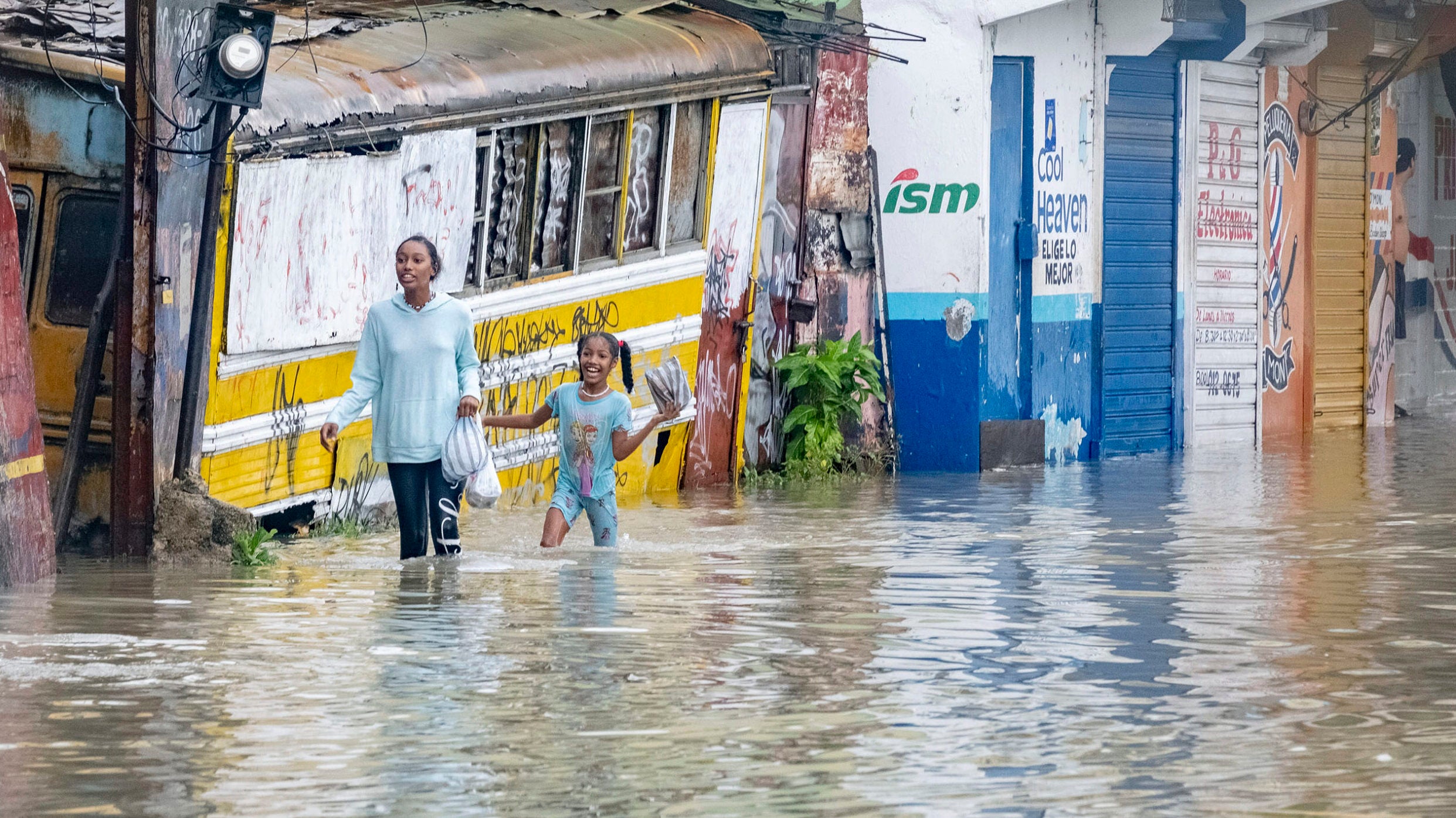Tropical Storm Franklin brings torrential rain to Dominican Republic, Haiti
SAN JUAN, Puerto Rico (AP) — Authorities in the Dominican Republic shut schools and government offices Tuesday as Tropical Storm Franklin took aim at the island of Hispaniola that it shares with Haiti and threatened to unleash landslides and heavy floods.
The storm had maximum winds of 40 mph (65 kph) by Tuesday night and was located 175 miles (280 kilometers) southwest of Santo Domingo, capital of the Dominican Republic, according to the National Hurricane Center in Miami.
Franklin was expected to make landfall on the island Wednesday and drop up to 10 inches (25 centimeters) of rain in both countries, with up to 15 inches (38 centimeters) in isolated areas. Heavy rainfall is of great concern to Haiti, where severe erosion in many places can lead to catastrophic flooding.
Dominican officials announced the closures of schools, government offices and businesses until Thursday. It also planned to close its main international airport and five others through Wednesday. In Haiti, where a day of heavy rain from a thunderstorm in June left more than 40 people dead, government officials urged caution but did not announce closures, though schools are already shuttered for summer holiday until mid-September.
In the Dominican capital of Santo Domingo, 42-year-old mechanic Pedro Julio de la Cruz said he and his family were mulling whether to stay with relatives who live on higher ground since he and his elderly mother and aunt live near the Ozama River in a community that floods often.
“We haven’t slept much,” he said, noting they were concerned because it started raining Monday night.
The storm was moving northward at 9 mph (15 kph).
Franklin could linger on top of Hispaniola for much of Wednesday before exiting to open water late in the day, according to the National Hurricane Center.
At least 24 of the Dominican Republic’s 31 provinces were under red alert as the storm approached, with the Public Works Ministry announcing that it dispatched 3,000 workers to more than a dozen provinces to prepare for Franklin. However, the government said the heavy rainfall forecast would not be a problem for the country’s multiple dams since water levels were low.
In the Haitian capital, Jerome Jean-Pierre, 46, who sells cold sodas from a wheelbarrow, said he heard about the storm on the radio and planned to stay indoors. He said he hoped Franklin would not impact Haiti like Hurricane Matthew did in October 2016.
“That was really horrible,” he said. “I saw a lot of people washed away.”
Mackenson Barbouze, a 34-year-old professor, said the timing of the storm is bad because Haiti is already struggling with a surge in gang violence, with more than 200,000 people forced to flee their homes.
“It will create chaos on top of what we’re dealing with,” he said, adding that the aftermath of storms is particularly bad in Haiti because the government is unable to respond quickly. “Most of the agencies are dysfunctional. They have the words, but they don’t have the power to get it done.”
On Tuesday afternoon, Haiti’s civil protection director Jerry Chandler said crews were mobilizing to help displaced people living in shelters or on the street, saying they needed to be “extremely careful.”
Prime Minister Ariel Henry also urged caution and warned people to stock up on water, food and medication and to stay out of the water until Thursday.
“The government is doing everything it can to help,” he said. “I know there are a lot of people who are worried, but we need to have confidence that we will act fast if necessary.”
A tropical storm warning was in effect for the entire southern coast of the Dominican Republic and Haiti, as well as the entire northern Dominican coast. A tropical storm watch was posted for the Turks and Caicos Islands.
Meanwhile, a tropical depression in the Gulf of Mexico strengthened overnight to become Tropical Storm Harold, which hit the southern coast of Texas on Tuesday and later weakened to a depression.
On Aug. 10, the National Ocean and Atmospheric Administration updated its forecast and warned that this year’s hurricane season would be above normal.
Between 14 to 21 named storms are forecast. Of those, six to 11 could become hurricanes, with two to five of them possibly becoming major hurricanes, the NOAA said.
The Atlantic hurricane season runs from June 1 to Nov. 30.
Sanon reported from Port-au-Prince, Haiti. Associated Press reporter Martín Adames Alcántara in Santo Domingo, Dominican Republic contributed.
